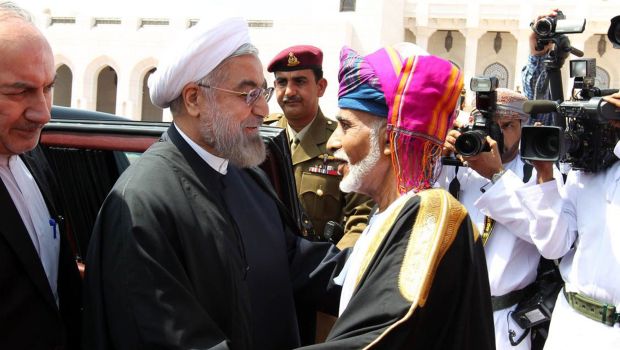
Iranian President Hassan Rowhani (L) is welcomed by Sultan of Oman Qaboos bin Said al Said (R), in Muscat, Oman, 12 March 2014. (EPA/PRESIDENTIAL OFFICIAL WEBSITE/HA HANDOUT)
The accord, signed during Iranian President Hassan Rouhani’s first visit to Muscat since his election last year, came out of a memorandum of understanding between the countries in August for the sale of Iranian gas to Oman from 2015, in a 25-year deal valued at around 60 billion US dollars.
Energy-hungry Oman agreed to buy gas from Iran as far back as 2005 and a later draft deal in 2007 included plans for Oman to process Iranian gas for export as liquefied natural gas (LNG).
But the two sides had never finalized terms and Oman had been pressured by the United States to source fuel from alternative suppliers such as Qatar, according to US embassy cables released by Wikileaks.
Iran sits on the world’s largest gas reserves, according to the latest statistics compiled by BP, but it has been prevented from exporting much of it because of Western sanctions over its contested nuclear program.
Oman’s state news agency ONA said three agreements were signed between Oman and Iran, one of which was an initial deal on building a gas pipeline linking Iran with Oman.
The agency said the accord was signed on Wednesday by an adviser of the Omani oil minister, Saif bin Hamad Al-Sulaimani, and the head of the Iranian negotiating team, Sayed Kamali. The other two contracts were on employment and training, ONA said without giving any further details.
IRNA quoted Iranian oil minister Bijan Zanganeh as telling journalists in Muscat that no price has been agreed for the gas, which will come from Iran’s giant North Pars field in the Gulf and which would branch off an Iranian pipeline planned to export gas to Pakistan.
“Today after seven months, finally the agreement to export Iranian gas to Oman was sealed,” IRNA quoted Zanganeh as saying.
He said the gas will be shipped through a 162 mile (260 km) pipeline that will be built through Iran’s Hormuzgan Province to Oman’s Sohar port on the other side of the Gulf and that the project was expected to come on stream within three years.
“We are entering the Omani retail market for the first time and contrary to other contracts, we have not agreed on a price,” Zanganeh said, according to IRNA.
He said Oman will use some of the gas for its domestic consumption but some of the gas may be sold abroad through a joint marketing company to be set up at a later date.
Zanganeh said Oman will pay for the entire cost of the pipeline and related infrastructure, estimated at around 1 billion dollars, adding that Muscat will be compensated for its investment through revenues generated from the sale of the gas.
Iran has won some relief from the sanctions in January after it halted its most sensitive nuclear operations under a preliminary deal with world powers reached in November.
